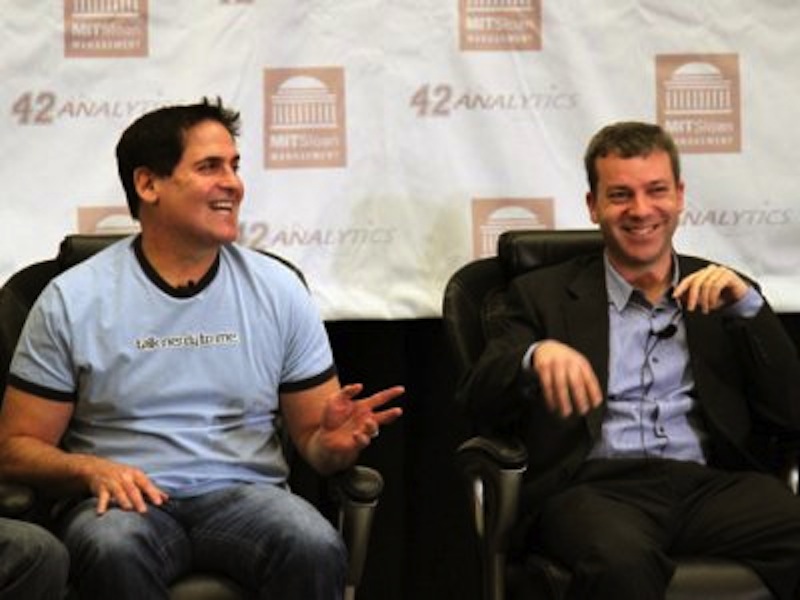BOSTON — The baseball box score should be completely retooled. Postseason experience has no value in the NBA playoffs. And sports leagues should give the No. 1 draft pick to the team that wins the most — after it’s mathematically eliminated.
These were some of the theories thrown around this weekend at a Boston convention center, where self-proclaimed stat geeks have come to the MIT Sloan Sports Analytics Conference with ideas to change the games — and the numbers to back them up. What started as a fringe on-campus gathering has grown into a two-day, 2,200-person convention with some of the biggest names, and biggest ideas, in sports.
The discussions in a spacious and packed ballroom covered new ways to evaluate players and teams in all major sports, with appearances from Dallas Mavericks owner Mark Cuban, comedian Drew Carey, who owns the Seattle Sounders of Major League Soccer, and the godfather of sports statistics: Bill James.
In a discussion called “Box Score Rebooted,” James argued for a new format that would include more advanced metrics than the outdated and overvalued batting average and pitching wins. Since baseball itself is unlikely to change a format that’s remained largely the same for more than a century, he called upon the statisticians in the room to come up with a better one.
“If we create an alternative scoring system on a more rational basis and we publish the data, within a couple of years there’s going to be a time when the Cy Young winner is different,” he said.
John Thorn, an official historian for Major League Baseball, acknowledged the sport is slow to change, but he noted the game-winning RBI was adopted — and then abandoned — so it can be done.
“Introducing a new statistic rocks our world in an unpleasant way,” he said.
The statistical revolution in sports began in many ways with James’ self-published and mimeographed newsletter and hit the mainstream with Michael Lewis’ book “Moneyball,” which was made into an Oscar-nominated movie starring Brad Pitt. The conference began in 2007 with a one-day affair attracting 175 people to MIT’s campus and has grown to two days and 2,200 people in a downtown Boston convention center.
Among them are about 700 students from 170 institutions, many of them looking for face-time with the general managers and team stats gurus who stock panels like “Baseball Analytics” (as well as football, hockey, basketball, soccer, ticketing, coaching and fantasy sports analytics). Also attending were representatives from 73 professional teams in all four major sports and soccer, both in the U.S. and England, including co-chairs Daryl Morey, the general manager of the Houston Rockets, and Jessica Gelman, a vice president of the Kraft Sports Group, which owns the New England Patriots.
Toronto Maple Leafs general manager Brian Burke played the contrarian, dismissing the Moneyball trend on Friday by saying, “Stats are like a lamppost to a drunk: useful for support but not illumination.”
“Have a parade, get a ring, and then write a book,” he said, noting that the Oakland Athletics, on whom “Moneyball” was based, have won just one playoff series since 1990. “Nobody has ever won a championship with Moneyball. I can prove a player is a statistical twin of a player who is twice the player he is, because of the other things that he brings.”
But elsewhere in the convention hall, graduate students and other statistical experts crunched their numbers and gave presentations they hoped would change the way sports works.
One researcher argued that there are 13 positions in basketball, not five — everything from ball-handler to paint-protector — and provided graphics that showed the NBA champion Dallas Mavericks had most of them covered (and the last-place Minnesota Timberwolves were riddled with redundancies).
Another argued that the PGA Tour shouldn’t promote any golfers from Q-school; several attacked the inefficiencies in ticket pricing; concussion expert Chris Nowinski argued for a hit count on young football and soccer players to mirror the pitch count that limits how much little league pitchers can throw.
Two presenters examined the costs and benefits of teams “tanking” to get a better draft pick.
Adam Gold, a Missouri grad student, argued teams should be ranked for draft order based on how they perform after they’re eliminated. This would encourage them to give their best effort at the end of the season, providing fans with the honest competition they paid for and maintaining the integrity of the playoff race. (It could also, detractors noted, lead some teams to just begin tanking earlier.)
“We should never have to consider that a loss can be more beneficial than a win,” he said.
Carey, “The Price is Right” host and Sounders co-owner, sat in on the “Franchises in Transition” panel and said he does everything he can to make hit team fan-friendly — even allowing the fans to vote on whether the general manager should be fired. The approach has helped — the Sounders have set an attendance record in each of their three seasons in MLS — but his team benefited from a little bit of luck.
“The guy that owned the basketball team moved to Oklahoma City. That helped us a lot,” he said. “It was like meeting a hot girl that had an abusive boyfriend.”
Send questions/comments to the editors.



Success. Please wait for the page to reload. If the page does not reload within 5 seconds, please refresh the page.
Enter your email and password to access comments.
Hi, to comment on stories you must . This profile is in addition to your subscription and website login.
Already have a commenting profile? .
Invalid username/password.
Please check your email to confirm and complete your registration.
Only subscribers are eligible to post comments. Please subscribe or login first for digital access. Here’s why.
Use the form below to reset your password. When you've submitted your account email, we will send an email with a reset code.